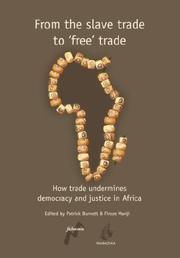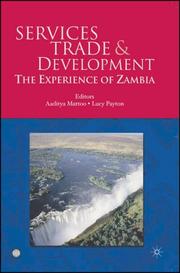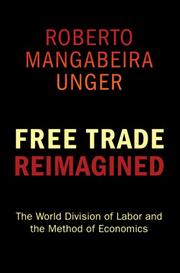| Listing 1 - 10 of 48 | << page >> |
Sort by
|
Dissertation
Year: 2007 Publisher: [S.l.] : [chez l'auteur],
Abstract | Keywords | Export | Availability | Bookmark
 Loading...
Loading...Choose an application
- Reference Manager
- EndNote
- RefWorks (Direct export to RefWorks)
Cotton --- Cotton --- production factors --- production factors --- Yield increases --- Market economies --- Market economies --- Domestic markets --- Domestic markets --- Trade liberalization --- Trade liberalization --- Market research --- Market research --- Support measures --- Support measures --- Burkina Faso --- Burkina Faso --- Cote d'Ivoire. --- Cote d'Ivoire --- Mali --- Mali --- Benin. --- Benin

Abstract | Keywords | Export | Availability | Bookmark
 Loading...
Loading...Choose an application
- Reference Manager
- EndNote
- RefWorks (Direct export to RefWorks)
International economic relations --- Democracy --- Free trade --- Slave trade --- Social justice --- Equality --- Justice --- Free trade and protection --- Trade, Free --- Trade liberalization --- International trade --- Africa --- Eastern Hemisphere --- Dependency on foreign countries.
Book
ISBN: 146233766X 1452731950 1282447998 9786613821188 1451911548 Year: 2007 Publisher: Washington, D.C. : International Monetary Fund,
Abstract | Keywords | Export | Availability | Bookmark
 Loading...
Loading...Choose an application
- Reference Manager
- EndNote
- RefWorks (Direct export to RefWorks)
This paper provides an update on the main elements of the reform agenda concerning the CEMAC trade regime as well as a tentative quantitative assessment of selected effects on tariff revenues and trade patterns. Notwithstanding data limitations, the key messages from the analysis are as follows. First, there is a need for a renewed political commitment to regional integration. In addition, key measures for improving compliance with the requirements for a customs union need to be introduced, including limiting tariff exemptions, phasing out remaining surcharges, strengthening the determination of products' country origin, and enhancing customs administration. There is also a need to improve transportation infrastructure and organization. Finally, there is a strong case for tariff reduction, with or without an EPA. Trade liberalization would help boost economic growth and poverty alleviation and limit risks of trade diversion with an EPA. Tariff reform should be complemented by improvements in domestic revenue mobilization.
Exports and Imports --- Taxation --- Trade: General --- Trade Policy --- International Trade Organizations --- International economics --- Public finance & taxation --- Tariffs --- Imports --- Exports --- Trade liberalization --- Trade policy --- Tariff --- Commercial policy --- Cameroon --- Foreign trade regulation --- Africa, Central --- Commerce. --- Commercial policy. --- Economic integration.
Book
Year: 2007 Publisher: Washington, D.C. : International Monetary Fund,
Abstract | Keywords | Export | Availability | Bookmark
 Loading...
Loading...Choose an application
- Reference Manager
- EndNote
- RefWorks (Direct export to RefWorks)
Efforts to liberalize world trade are increasingly focusing on strengthening the links between low-income countries’ trade policies and their development strategies. However, although greater trade openness promises faster growth for poor countries, it also presents risks to those with small and undiversified economies. This pamphlet explores research by Fund staff into the nature and magnitude of these risks and proposes targeted policy solutions to ease adjustments and encourage developing countries to choose fuller participation in the world trading system.
Exports and Imports --- Taxation --- International Economics --- Trade Policy --- International Trade Organizations --- Trade: General --- International economics --- Public finance & taxation --- International trade & commerce --- Tariffs --- Trade liberalization --- Trade facilitation --- Exports --- Imports --- Tariff --- Commercial policy --- Customs administration --- China, People's Republic of

ISBN: 1281720852 9786611720858 9264033696 9264033688 Year: 2007 Publisher: Paris, France : OECD,
Abstract | Keywords | Export | Availability | Bookmark
 Loading...
Loading...Choose an application
- Reference Manager
- EndNote
- RefWorks (Direct export to RefWorks)
This report aims to answer two major questions: (1) How beneficial are the trade preferences provided to developing countries; and (2) what are the implications of possible erosion of these benefits under multilateral trade liberalisation? The report focuses on trade preferences provided by the so-called Quad countries (Canada, the European Union, Japan and the United States) because they have some of the world’s highest tariffs on agricultural commodities. Findings from this study suggest that although preferential margins will be eroded with multilateral liberalisation, this may be a problem only for certain countries and within specific sectors, and that factors not related to preferential trade schemes may be limiting the exports of the least-developed countries (LDC).
Developing countries -- Commerce. --- Free trade. --- Tariff preferences. --- Trade blocs. --- Tariff preferences --- Trade blocs --- Free trade --- Commerce --- Business & Economics --- International Commerce --- Free trade and protection --- Trade, Free --- Trade liberalization --- Regional economic blocs --- Regional trading blocs --- Trading blocs --- Differential duty --- Discriminating duty --- Generalized system of preferences (Tariff) --- GSP (Tariff) --- Preferences, Tariff --- Preferential duty --- Preferential tariff --- Trade preferences --- International trade --- Tariff --- Canada --- European Union --- Japan --- United States

ISBN: 0821369849 0821368494 0821369830 9786610819386 1280819383 0821368508 Year: 2007 Publisher: Basingstoke ; New York : Washington, DC : Palgrave Macmillan ; World Bank,
Abstract | Keywords | Export | Availability | Bookmark
 Loading...
Loading...Choose an application
- Reference Manager
- EndNote
- RefWorks (Direct export to RefWorks)
Some see trade in services as irrelevant to the development agenda for least developed countries (LDCs). Others see few benefits from past market openings by LDCs. This book debunks both views. It finds that serious imperfections in Zambia's reform of services trade deprived the country of significant benefits and diminished faith in liberalization. What is to be done? Move aggressively and consistently to eliminate barriers to entry and competition. Develop and enforce regulations to deal with market failures. And implement proactive policies to widen the access of firms, farms, and consumers
Service industries. --- Service industries --- Free trade --- International trade --- Business & Economics --- Industries --- Evaluation --- Government policy --- International trade. --- Evaluation. --- External trade --- Foreign commerce --- Foreign trade --- Global commerce --- Global trade --- Trade, International --- World trade --- Free trade and protection --- Trade, Free --- Trade liberalization --- Commerce --- International economic relations --- Non-traded goods

ISBN: 9780691134291 Year: 2007 Publisher: Princeton, N.J. Princeton University Press
Abstract | Keywords | Export | Availability | Bookmark
 Loading...
Loading...Choose an application
- Reference Manager
- EndNote
- RefWorks (Direct export to RefWorks)
Foreign trade policy --- International economic relations --- Free trade --- Globalization --- 382.10 --- 382.11 --- 382.33 --- AA / International- internationaal --- Free trade and protection --- Trade, Free --- Trade liberalization --- International trade --- Economic aspects --- Theorieën van internationale en interregionale handel: algemeenheden. Comparatieve voordelen --- Theorie van het internationale evenwicht. Economische onafhankelijkheid van een natie. Globalisering. Mondialisering --- Vrijhandel
Book
ISBN: 146232052X 1452748101 1283517701 9786613830159 1451910703 Year: 2007 Publisher: Washington, D.C. : International Monetary Fund,
Abstract | Keywords | Export | Availability | Bookmark
 Loading...
Loading...Choose an application
- Reference Manager
- EndNote
- RefWorks (Direct export to RefWorks)
Is the recent proliferation of Regional Trade Agreements (RTAs) in Asia a healthy development, or runs the risk of turning into an unmanageable "noodle bowl" in the future? The goal of this paper is to shed some light on this question. The results show that membership in the Asian RTAs considered in this study have not, to date, occurred at the expense of trade with nonmembers, as most Asian countries' integration with the global economy preceded regional integration. However, looking forward, given their discriminatory nature, a proliferation of RTAs, which is not accompanied by continuing unilateral and multilateral liberalization, could run the risk of leading to costly trade diversion.
Exports and Imports --- Trade Policy --- International Trade Organizations --- Empirical Studies of Trade --- Trade: General --- International economics --- Trade balance --- Trade agreements --- Imports --- Customs unions --- Trade liberalization --- Balance of trade --- Commercial treaties --- Protectionism --- Commercial policy --- Lao People's Democratic Republic --- Trade blocs --- Southeast Asia --- Commerce. --- Commercial policy.
Book
ISBN: 146238711X 1452755167 1283512807 1451911092 9786613825254 1451866569 Year: 2007 Publisher: Washington, D.C. : International Monetary Fund,
Abstract | Keywords | Export | Availability | Bookmark
 Loading...
Loading...Choose an application
- Reference Manager
- EndNote
- RefWorks (Direct export to RefWorks)
This paper considers the effects of trade policy-tariffs and quotas-when importing is done by competitive traders who are identical ex ante but differ ex post. We show that the standard equivalence results no longer hold and the conventional ranking of tariffs and quotas is turned on its head: quotas are not as bad for welfare as previously believed, while tariffs may restrict trade by more than originally intended. Furthermore, the allocation of property rights (quota licenses) has real effects beyond the distribution of rents; this, in turn, has implications for the effects of corruption on welfare.
Exports and Imports --- Taxation --- Trade Policy --- International Trade Organizations --- Market Structure, Firm Strategy, and Market Performance: General --- Trade: General --- International economics --- Public finance & taxation --- Tariffs --- Trade liberalization --- Imports --- Trade policy --- Import quotas --- Taxes --- International trade --- Tariff --- Commercial policy --- Nigeria --- Non-tariff trade barriers --- Econometric models.
Book
ISBN: 146230785X 1455240672 1283535955 9786613848406 1455265829 Year: 2007 Publisher: Washington, D.C. : International Monetary Fund,
Abstract | Keywords | Export | Availability | Bookmark
 Loading...
Loading...Choose an application
- Reference Manager
- EndNote
- RefWorks (Direct export to RefWorks)
IMF research summary on how globalization affects developing countries (by Prachi Mishra and Petia Topalova); country study on Croatia (by Athanasios Vamvakidis); listing of visiting scholars at the IMF during June 2007-January 2008; listing of contents of Vol. 54, Issue No. 3 of IMF Staff Papers; listing of recent IMF Working Papers; and listing of recent external publications by IMF staff members.
Exports and Imports --- Labor --- Macroeconomics --- Public Finance --- Emigration and Immigration --- Remittances --- Trade Policy --- International Trade Organizations --- International Migration --- Wages, Compensation, and Labor Costs: General --- Globalization: General --- International economics --- Labour --- income economics --- Migration, immigration & emigration --- Globalization --- Migration --- Wages --- Trade liberalization --- Balance of payments --- Population and demographics --- International trade --- International finance --- Emigration and immigration --- Commercial policy --- Croatia, Republic of --- Income economics
| Listing 1 - 10 of 48 | << page >> |
Sort by
|

 Search
Search Feedback
Feedback About UniCat
About UniCat  Help
Help News
News